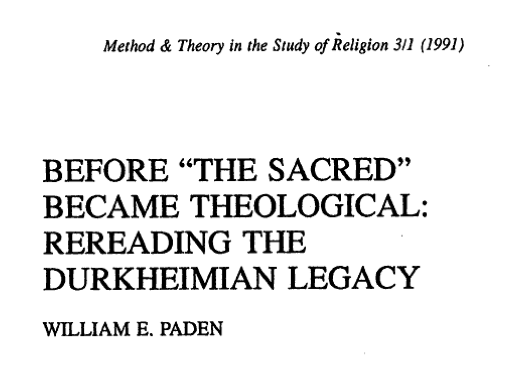 I wrote a post recently in which I critiqued a new book by Brent Plate, saying it (along with other developments in the field, such as the turn toward so-called embodied or lived religion) was evidence that the work of Eliade was still representative of the field, no matter how much distance some may claim separates us today from when he first wrote many of his now famous studies in the history of religions (that is, back in the 1950s). I was lucky enough to have Brent comment on the post and a brief back-and-forth resulted, during which he posted the following comment:
I wrote a post recently in which I critiqued a new book by Brent Plate, saying it (along with other developments in the field, such as the turn toward so-called embodied or lived religion) was evidence that the work of Eliade was still representative of the field, no matter how much distance some may claim separates us today from when he first wrote many of his now famous studies in the history of religions (that is, back in the 1950s). I was lucky enough to have Brent comment on the post and a brief back-and-forth resulted, during which he posted the following comment:
I may be an unwitting Eliadean. So be it.
For some time I’ve been privately predicting to a few friends that the work of Eliade would be, or already was, making a return (insert your own “eternal return of the same” jokes here). It’s a prediction premised on two assumptions that I now offer publicly.
First, as I’ve argued elsewhere, a decontextualized approach, such as his own, that reduces — yes, it’s as reductionistic as any — diverse human actions and claims to a supposedly unified experience of the thing he called “the sacred” offers an appealing model for anyone trying to overlay a grand, developmental narrative onto human history, as a way to tame and thereby make sense of what others would name as difference, diversity, competition, even outright contradiction. In a word, it offers what many would characterize as an ahistorical response to historical situations — i.e., when happenstance and contingency seem to defy our efforts to make sense of the world as a predictable, uniform, and thus understandable place. I think that the temptation to make the environments in which we find ourselves habitable by making moves we see in his body of work is great indeed, so one would expect that such approaches would not go away any time soon.
But second, the generation of scholars that followed Eliade, those who developed some pretty strong and persistent critiques of his work (both its academic shortcomings as well as the possible socio-political motives or effects of such an approach), is now at the point of retirement in their own careers, which means that the fierce battles over theory and method in the study of religion that were waged in the 1980s — when many of these now senior scholars were themselves rising to prominence and when the then dominant Eliadean approach was for the first time seen as a problem — now seem like ancient history to the next generation (in which I would plot myself), or better yet, to the one after that (i.e., those now starting their careers) or the one coming along after that (those in undergrad or grad programs now).
And once again, we come back to this over-used notion of the eternal return, I guess — the sorts of critiques that once seemed to hold this decontextualized approach at bay within the academy, to whatever extent, are now more than likely not read all that much, which nicely clears the way to, for example, assume that anyone who uses the word “sacred” –as either noun or adjective — is doing so in the same fashion, making their works interchangeable.
Note to self: start citing William Paden‘s important essay more often (also reprinted in this volume).
 So my argument is that when the first — the persistent urge to dehistoricize in the service of making an authorized place in the here and now — meets the second — the eventual decline of ardent critiques of how this tendency is enshrined within academia itself — we find scholars who simply dismiss the critique by replying “So be it” when their work is read as exemplifying what others see to be some rather problematic features in the field.
So my argument is that when the first — the persistent urge to dehistoricize in the service of making an authorized place in the here and now — meets the second — the eventual decline of ardent critiques of how this tendency is enshrined within academia itself — we find scholars who simply dismiss the critique by replying “So be it” when their work is read as exemplifying what others see to be some rather problematic features in the field.
The punchline is simple: each academic generation bears the responsibility to continue the critique, should any of its members think that the academic study of religion can or ought to be something other than a learned repetition of the sort of claims that are often made by the very people whom we study (e.g., claims of transcendental identities and assumptions of human actors being little more than passive recipients of meanings projected from elsewhere). For if our field is something other than well-meaning paraphrases then the argument for that to be the case can probably never be presumed but, instead, must continually be made and remade.